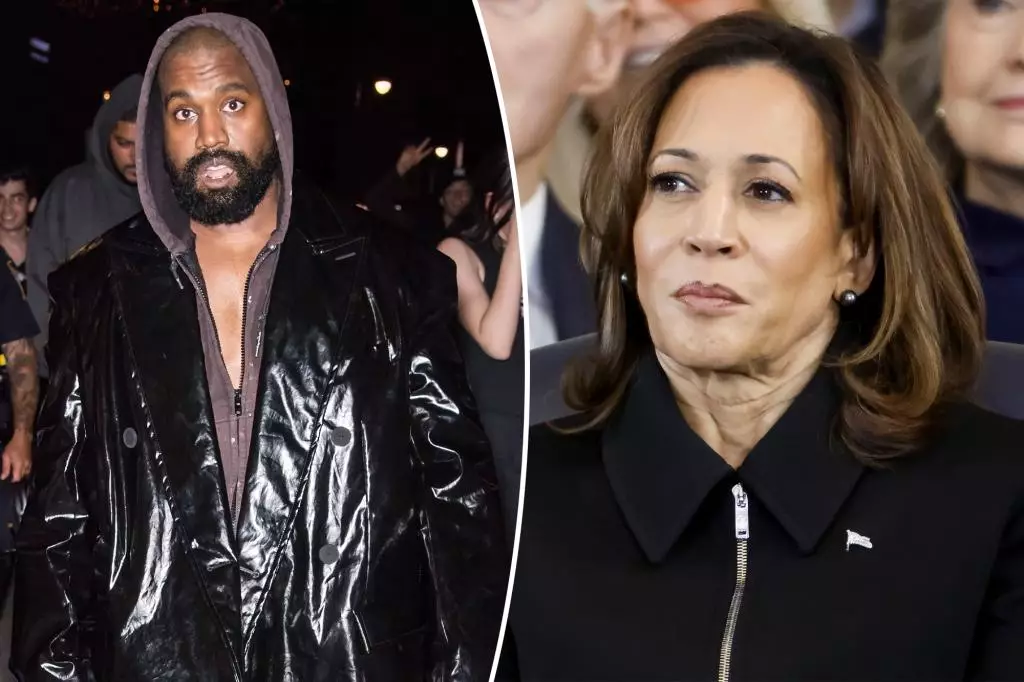In a recent episode of celebrity theatrics that exemplifies the chaotic nature of social media interactions, Kanye West found himself in hot water after generating considerable controversy with a sexually charged tweet directed at former Vice President Kamala Harris. The tweet, which essentially stated, “I used to want to f—k Kamala until she lost,” was promptly met with backlash and was deleted shortly thereafter. This incident serves not only as a reflection of West’s often reckless approach to social media but also as a lens through which to examine the broader implications of celebrity interactions and public accountability in our digital age.
A Pattern of Provocation
Kanye West, known for his candid and often provocative statements, has a long history of making headlines for the wrong reasons. From his infamous interruption of Taylor Swift at the 2009 MTV Video Music Awards to a series of anti-Semitic remarks that led to his ban on social media, West’s brand has become synonymous with contentious and polarizing expressions. In this latest incident, West’s comment — which scapegoats political affiliation and undermines the dignity of personal relationships — is indicative of a troubling trend where celebrities use their platforms to amplify harmful rhetoric.
His follow-up tweet, which dismissed the Democrats by claiming, “They don’t control black people no more,” discusses a critical issue regarding the ownership of narratives within the African American community. West positions himself as a self-proclaimed voice of independence when, in fact, he might be reinforcing damaging stereotypes. This contradictory stance complicates his legacy, juxtaposing moments of genuine artistic brilliance with instances of appalling insensitivity.
The role of social media in shaping public personas can’t be overstated. Platforms like Twitter, now rebranded as “X,” allow celebrities like West to communicate directly with their audience, bypassing traditional media filters. However, this unmediated access can lead to dangerous ramifications. Unsurprisingly, the repercussions of West’s outbursts have led many to question whether he considers the potential impact of his words on various communities. The argument could be made that the allure of virality supersedes the responsibility associated with fame.
West even exclaims in one of his tweets, “The world is so lucky to have me,” which raises concerns about a celebrity culture steeped in narcissism. This kind of self-aggrandizement fails to acknowledge the influence such statements can have on young people, especially in regard to respect and interactions across gender and political lines.
Taking a step back, the ongoing feud between Kanye West and Taylor Swift re-emerges as a parallel storyline in this drama. Their complex and tumultuous history, born from mutual distrust and public spectacle, demonstrates the complexities of celebrity relationships entwined with narrative manipulation. West’s earlier comments about Swift come rushing back into public discourse as fans recall the awkwardness of their interactions. Swift, who has worked hard to establish her own narrative and brand —especially with her recent album titled “The Tortured Poets Department”— can easily find herself entangled in West’s provocative rhetoric once more, especially with major events like the upcoming Grammys on the horizon.
With both artists nominated for prestigious awards, their paths might cross again. This only highlights the interconnectedness of celebrity lives — they often revolve around a cycle of conflict, reconciliation, and immediate repercussions. The public’s appetite for drama often overlooks the deeper impacts such feuds can have not only on the individuals involved but also on their audience.
Kanye West’s recent antics prompt a broader conversation about personal accountability in the age of social media. While celebrities are entitled to express their opinions, the careless disregard exhibited by West poses questions that stretch beyond mere entertainment. His actions, whether intended as jest or reflection, underscore a need for greater consideration of the power dynamics at play in society and the ethics of public discourse.
The ingredients for celebrity culture remain potent: fame, infamy, and obsessive media coverage. However, as audiences become increasingly aware, there may be a growing demand for a more conscious approach to celebrity influence—one where personal integrity trumps the fleeting allure of shock value. In a world rife with misinformation and divisive rhetoric, the onus is on both public figures and their cohorts to elevate and enrich the dialogues we hold as a society.

Leave a Reply